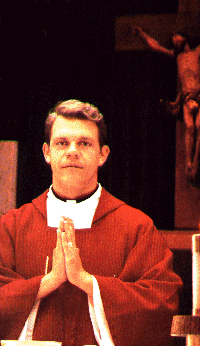 Fr. Mark Buckley once told the story of a boy who was having trouble keeping still during the celebration of eucharist. Afterwards, the boy told Fr. Mark, "I want to be a priest like you some day." The priest, overjoyed, asked the boy what helped him to decide this. "Well," the boy said, "if I have to go to church, I'd rather be up there moving around and shouting than sitting and having to be quiet!"
Fr. Mark Buckley once told the story of a boy who was having trouble keeping still during the celebration of eucharist. Afterwards, the boy told Fr. Mark, "I want to be a priest like you some day." The priest, overjoyed, asked the boy what helped him to decide this. "Well," the boy said, "if I have to go to church, I'd rather be up there moving around and shouting than sitting and having to be quiet!"
This story highlights a common image that Catholics, young and old, have of priests. We tend to think of priests as leaders, set apart from the rest of the community, who "do things for us." For example, they say prayers and give out sacraments, run parishes and organise charities. But this image does not completely evoke what it is to be a priest, for at least two reasons.
First, it makes the role of those Catholics who are not ordained priests (i.e. the laity) seem too simple! Lay people are not baptised to "sit and keep quiet." The church teaches that all believers, through baptism, are priests. That is, by living lives of faith, hope, and charity in their unique situations, they too make known to others the presence of God and the reality of his Kingdom. The church calls this grace the common priesthood of the faithful. It has a basis in the New Testament. For example, the apostle Peter told Christians in Asia Minor: "You are a chosen race, a royal priesthood, a holy nation, God's own people, in order that you may proclaim the mighty acts of him who called you out of darkness into his marvellous light." (1 Peter 2:9)
So how is the "common priesthood" for Catholics different from the ordained or ministerial priesthood? There isn't a fixed answer. The church teaches that there is an "essential difference" but its understanding of that difference is still developing. Our Protestant brothers and sisters are right to point out that there was no distinct ministry of priesthood in the church of the New Testament. There were, however, "apostles", who were distinguished by their authority to teach, and "deacons", who were responsible for works of charity. In contrast, the Jews had a long tradition of setting aside priests (Levites) to act as "mediator" or "go-between" of God and his people, by offering Temple sacrifices for the forgiveness of sin. St. Paul taught, however, that Jesus alone is the mediator between God and his people (1 Timothy 2:5). On the other hand, St. Paul also understood the celebration of eucharist as a living proclamation of Jesus' death (1 Corinthians 11:26). The church began to identify the role of those who presided over such celebrations, i.e. bishops (episcopoi) who were the successors of the apostles and later, priests or presbyters who "filled in" for the bishop locally, with that of the Jewish priests. And thus the two traditions of priests as authoritative teachers and as mediators between God and his people merged. When the church began eventually to speak of priests as "acting in the person of Christ its Head" (in persona Christi Capitis), it usually had in mind either or both of these two responsibilities: teaching what Christ taught; acting on behalf of the whole community to present prayer, and especially the eucharist, to God.
Understood in this way, the church came to distinguish between the "common priesthood" in which all believers share, through baptism, and the "ministerial priesthood" which is the gift of a distinct sacrament, Holy Orders. The difference has nothing to do with being more holy or more loved by God. It is a difference relating to the nature of the gift given by God, through Holy Orders, that obliges priests to serve God's people in the two particular ways we have been discussing. This is the sort of distinction St. Paul had in mind when he wrote: "There are varieties of gifts, but the same Spirit; and there are varieties of services, but the same Lord....To each is given the manifestation of the Spirit for the common good." (1 Corinthians 12: 4-5,7)
But there is more. I mentioned at the beginning that there was a second reason why Catholics' typical image of priests is incomplete. Often we tend to focus only on what priests do (teach, mediate) and so never raise the question of who priests are. [What I have to say next is not church teaching but the personal reflection of a lay Catholic.] Priests today often do not have a sense of the specific gift that is theirs through Holy Orders. We realise that the sacrament empowers priests to "do", but often do not reflect on what interior change God brings about in them to enable them to serve us in these ways.
(to be continued)
Comments?
Back to the RCIA index page.
Back to the Friendship page.